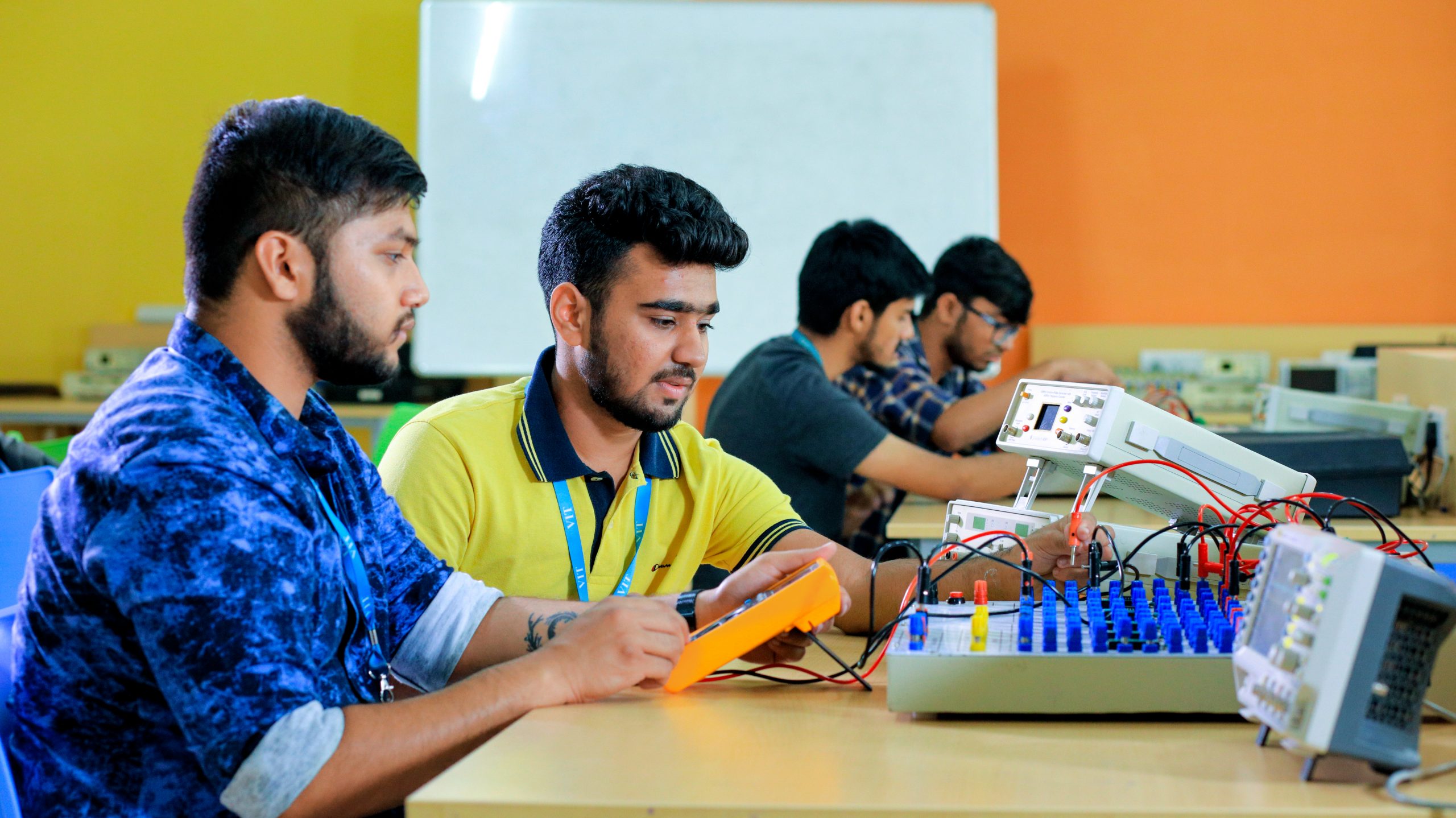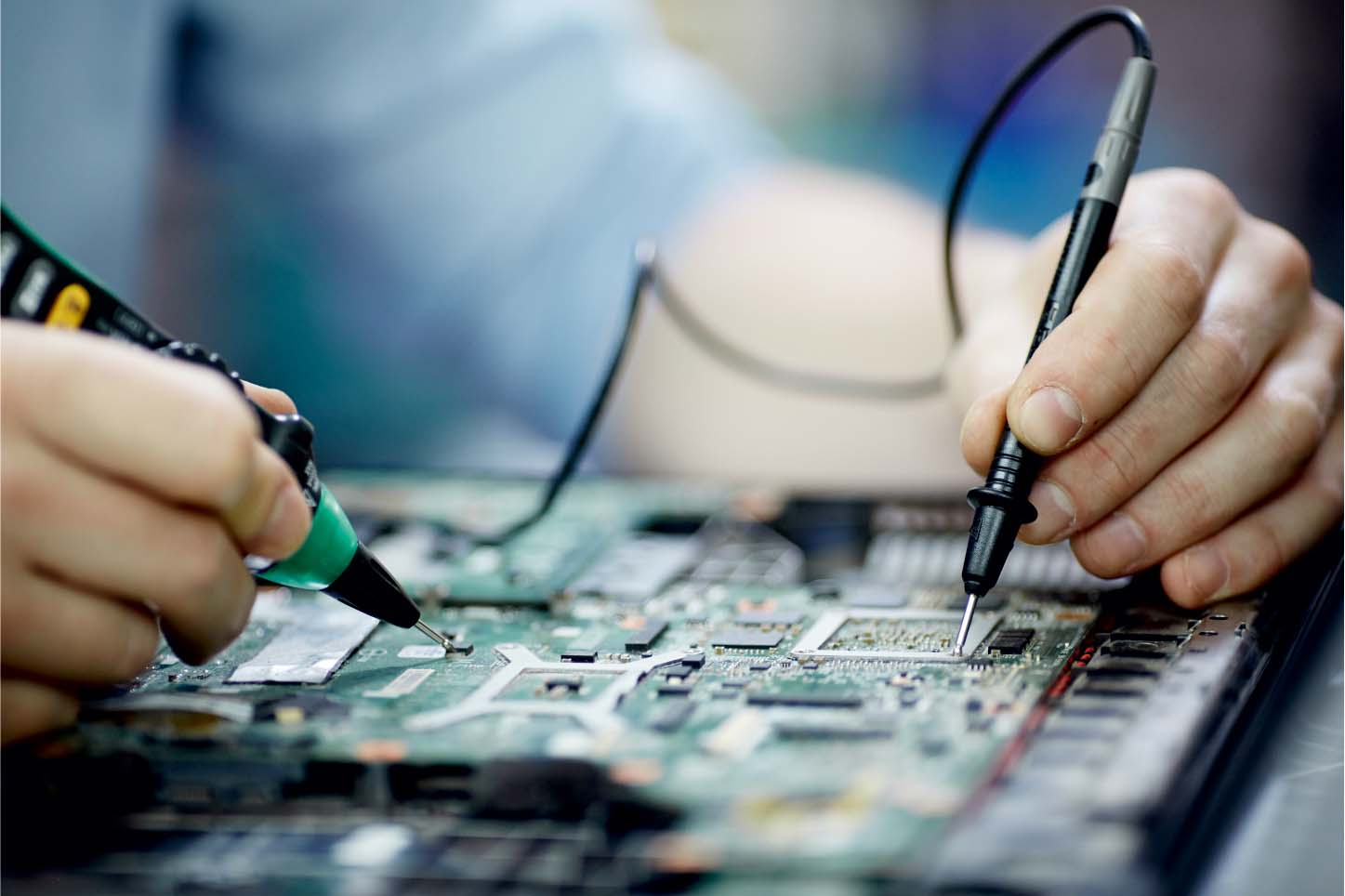GLOBAL TRENDS IN VLSI:
The global electronics industry market is expected to reach approximately USD 1,787 billion by 2024 as projected by Zion Market Research. The rapid progress of electronics industry has been possible due to the development of high performance electronics economically. Premise has been propelled by the art of miniaturization of electronic components i.e. very large scale integration (VLSI). The advancements made in VLSI has not only revolutionized the field of high performance computing but also transformed the field of consumer electronics, defence, health care, telecommunication to cite a few. The global trends in VLSI pivots around five major sub-divisions:
a) AI based VLSI systems: This branch revolves around using AI techniques for designing smart VLSI systems. This could include intelligent decision making, pruning, and optimization during VLSI designing. Another dimension to this is using bio-inspired algorithms for VLSI circuit designs especially architecture decision making.
b) ML based VLSI systems: This branch revolves around using ML techniques for designing smart energy aware VLSI systems. This encompasses ML algorithms such as support vector machines, neural networks; random forest etc. that are either converted to hardware accelerators or used for classification of patterns. This becomes a very important specialization of engineering for next generation VLSI systems.
c) Hardware based Cybersecurity in VLSI systems: This branch hinges around making VLSI based systems secured from cyber threats such as small scale, medium scale and large scale hacks at chip level. Another dimension is securing hardware accelerators used in consumer electronics products such as camera, video camcorder, smart watches etc. against counterfeited integrated circuits, cloned chips etc.
d) VLSI for computer vision, IoT and image processing: This branch deals with interdisciplinary projects where complex image processing and image compression functions are performed directly by designed VLSI systems or chips, without involvement of software tools. Several national and international research groups work on this area.
e) Radiation hardened VLSI systems: This branch deals with designing VLSI systems that are robust against radiation impacts, which is especially useful in space electronics such as embedded/control systems used in aircrafts, jets, satellites, rockets etc.
About -M.Tech VLSI Design
Considering the high demand and wide scope of VLSI engineers in India and abroad, VIT Bhopal, has introduced a two year M.Tech programme in VLSI Design. The programme is meticulously designed in such a way that students obtain expertise in the design and development of integrated circuit (IC) at the material, device, circuit and system levels. The main features of the programme are:
- The M.Tech. programme in VLSI Design is a two-year course.
- The programme provides strong knowledge in VLSI system at various levels of design with emphasis on system on chip (SoC) development. Further, the curriculum aims at training students by incorporating state of the art development in VLSI domain like role of AI in designing VLSI IC.
- It imparts skills in design and development of thrust areas, like, low power high speed devices, analog/RF IC design, advanced VLSI system design, next generation interconnect technology, VLSI in IoT development and cyber security in VLSI systems
- The programme aids to advance skill sets in both hardware and software VLSI domain, thereby not only widening the spectrum of job opportunities but also in pursuing a career in research and development.
- Students gain hands on experience in the state of art laboratories, established under industrial collaboration.
ABOUT THE CURRICULUM:
The programme curriculum is aimed at VLSI system design (both Front end & Back end) covering algorithms, hardware description languages, system architectures, physical designs, verification techniques, Simulation & Synthesis, analog/RF IC design, low power design techniques, mixed mode design methodologies and SoC design. Two mandatory industrial internships with research oriented projects are a part of the curriculum.
-


Curriculum Highlights
Analog integrated circuit (IC) design
Physics and modelling of semiconductor devices
Digital integrated circuit (IC) design
AI for chips
Next generation interconnect technology
High speed/low power device designVLSI design
Integrated circuit (IC) fabrication technology
Mixed integrated circuit (IC) design
CAD for VLSI
Digital signal processing
System on Chip (SoC) design
Radio frequency (RF) integrated circuit (IC) design
Testing of integrated circuit (IC)
Career Prospects:
The modern field of VLSI is constantly evolving and heading towards integration of inter-domain specializations from computer science, electronics engineering, mathematics etc. Through this MTech programme , VIT Bhopal strives to impart multidisciplinary expertise to students in order to enhance their employability. The career opportunities are immense starting from highly paid pure research positions in major national and international research centers (such as IITs, IISc, DRDO, ISRO etc.), to industrial R&D in top national and international commercial sectors (Google, FotoNation, Intel, AMD, NVIDIA, TI, Synopsys, Cadence, Apple, Toshiba etc.), with opportunities for higher studies in foreign universities. Additionally, on gaining expertise in the niche areas, there are chances of high quality consultancy work and doing independent R&D projects funded by government and/or industry.
-


The various career options for a
• VLSI programmer
VLSI graduate are:
• Circuit design engineer
• Graphic hardware engineer
• EDA tool developer
• Front end/back end design ASIC/FPGA
• DFT engineer
• Logic library expert
Testimonials:
Sanjana Tiwari , M.Tech VLSI (2019 – 2021) Intern: Intel
 Collaborative learning at VIT Bhopal helped me hone my skills and gain practical knowledge, which is very essential for an M.Tech student. The niche curriculum emphasizes on the current trends in the VLSI domain with the required industrial exposure. Apart from this, the extensive placement training sessions helped to prepare well for the recruitment process without any difficulty which helped me bag my Super dream Internship at Intel.
Collaborative learning at VIT Bhopal helped me hone my skills and gain practical knowledge, which is very essential for an M.Tech student. The niche curriculum emphasizes on the current trends in the VLSI domain with the required industrial exposure. Apart from this, the extensive placement training sessions helped to prepare well for the recruitment process without any difficulty which helped me bag my Super dream Internship at Intel.
Mayuresh Joshi M.Tech VLSI (2019 – 2021) Intern: Media Tek
 The state of art laboratories with latest softwares used in VLSI Industry helped me improve my skill set. The curriculum is designed as per the industry requirements as well as all the basics are covered. Rigorous campus recruitment training with regular sessions of mock interviews, aptitude tests helped me acquire an Internship at MediaTek
The state of art laboratories with latest softwares used in VLSI Industry helped me improve my skill set. The curriculum is designed as per the industry requirements as well as all the basics are covered. Rigorous campus recruitment training with regular sessions of mock interviews, aptitude tests helped me acquire an Internship at MediaTek


